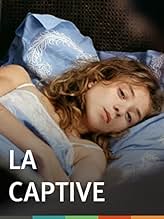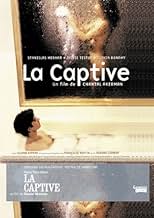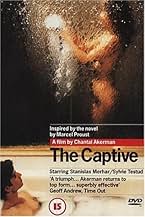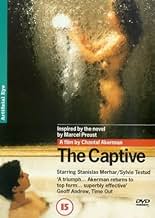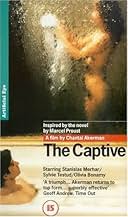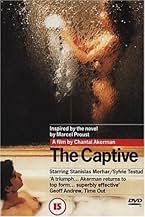CALIFICACIÓN DE IMDb
6.0/10
2.3 k
TU CALIFICACIÓN
La relación entre una mujer y su celosa pareja, cuya necesidad de poseerla lo convierte en rehén de sus propios deseos destructivos.La relación entre una mujer y su celosa pareja, cuya necesidad de poseerla lo convierte en rehén de sus propios deseos destructivos.La relación entre una mujer y su celosa pareja, cuya necesidad de poseerla lo convierte en rehén de sus propios deseos destructivos.
- Dirección
- Guionistas
- Elenco
- Premios
- 3 nominaciones en total
- Dirección
- Guionistas
- Todo el elenco y el equipo
- Producción, taquilla y más en IMDbPro
Opiniones destacadas
Modern day adaptation of a section of Proust's magnum opus that is true enough to the book in its theme and events and interestingly has the Marcel character still sunk in an archaic, aristocratic world.
KD Lang lookalike Stanislas Merhar does a good job doing the insulated, emotional (and physical) frailty, trapped in an adolescent infatuation of towering poetic naivety, all the while consumed with jealousy by the suspicion that his live-in girlfriend is an active lesbian behind his back.
It's slow. There's a lot of prowling around his creaking Paris apartment, lots of talking in cars - we seem to be taking entire journeys in real time. Akerman gave herself an easy directing job. The use of classical music is lazy - Schubert's Arpeggione Sonata is suitably Proustian, but Rachmaninov's Isle of the Dead is absurdly melodramatic, especially when played incongruously, Godard-fashion, over serene images.
Those familiar with the writer and director can easily pull back the gauze to reveal the real issues - an inverted couple struggling to maintain a hetero relationship - but that is so superficial it hardly seems worth special effort and the film works better with the ambiguity in place (as intended), with the implication that naivety (misunderstanding, confusion) is at the root of jealous passion. The Marcel character is so naïve that in the sex scenes he doesn't even know that he is supposed to put it in - doing the movements without getting undressed (he's in bed in his overcoat in one scene). That was strangely tragic, and although it may have been a stylisation to symbolise their failure to connect, it was easier to take it literally.
With liberties like that though, and done so earnestly, it's craves some indulgence. The worst problem is that the girl is comatose and unattractive, showing nothing of Albertine's sprightliness and guile that gave that character her painful duplicity. The ending too is a disappointment.
KD Lang lookalike Stanislas Merhar does a good job doing the insulated, emotional (and physical) frailty, trapped in an adolescent infatuation of towering poetic naivety, all the while consumed with jealousy by the suspicion that his live-in girlfriend is an active lesbian behind his back.
It's slow. There's a lot of prowling around his creaking Paris apartment, lots of talking in cars - we seem to be taking entire journeys in real time. Akerman gave herself an easy directing job. The use of classical music is lazy - Schubert's Arpeggione Sonata is suitably Proustian, but Rachmaninov's Isle of the Dead is absurdly melodramatic, especially when played incongruously, Godard-fashion, over serene images.
Those familiar with the writer and director can easily pull back the gauze to reveal the real issues - an inverted couple struggling to maintain a hetero relationship - but that is so superficial it hardly seems worth special effort and the film works better with the ambiguity in place (as intended), with the implication that naivety (misunderstanding, confusion) is at the root of jealous passion. The Marcel character is so naïve that in the sex scenes he doesn't even know that he is supposed to put it in - doing the movements without getting undressed (he's in bed in his overcoat in one scene). That was strangely tragic, and although it may have been a stylisation to symbolise their failure to connect, it was easier to take it literally.
With liberties like that though, and done so earnestly, it's craves some indulgence. The worst problem is that the girl is comatose and unattractive, showing nothing of Albertine's sprightliness and guile that gave that character her painful duplicity. The ending too is a disappointment.
This film gets only 5.9?! First, I love Proust, but you do not have to read this specific part of 'In Search of Lost Time' to appreciate this extraordinary story of obsession and the need of one lover to absorb another, and the other lover to need to keep both a distance and a mystery in the relationship.
Chantal Akerman was arguably one of France's greatest directors before she was tragically lost. She was focused in a way that makes most directors seem fuzzy, and her talent with both images and actors was unbeatable. That her images and pacing take their time demands attention from an audience like any work of art. She uses Rachmaninov's music 'Isle of the Dead' as a key motif in sound that puts other overlaid music in most films to shame. I am here to praise this film, but her work as a whole deserves perhaps more praise than it gets. Eric De Kuyper, a great writer who wrote the script with her, is also a filmmaker of importance. Eric De Kuyper, a great writer who wrote the script with her, is also a filmmaker of importance. Everything is in order in this film. Both lead actors are superb, especially Stanislas Merhar who is, in my opinion, a male Garbo among actors. Elusive, beautiful and always holding an essential mystery in his way of acting, he rivets the gaze of the viewer to the screen. There is nothing to fault in this film, and impatient viewers, which most reviewers are, should watch it more than once. It deserves more than the insulting 5.9 it has been given, but then this perhaps reflects the quality of the eyes and minds that receive it.
Chantal Akerman was arguably one of France's greatest directors before she was tragically lost. She was focused in a way that makes most directors seem fuzzy, and her talent with both images and actors was unbeatable. That her images and pacing take their time demands attention from an audience like any work of art. She uses Rachmaninov's music 'Isle of the Dead' as a key motif in sound that puts other overlaid music in most films to shame. I am here to praise this film, but her work as a whole deserves perhaps more praise than it gets. Eric De Kuyper, a great writer who wrote the script with her, is also a filmmaker of importance. Eric De Kuyper, a great writer who wrote the script with her, is also a filmmaker of importance. Everything is in order in this film. Both lead actors are superb, especially Stanislas Merhar who is, in my opinion, a male Garbo among actors. Elusive, beautiful and always holding an essential mystery in his way of acting, he rivets the gaze of the viewer to the screen. There is nothing to fault in this film, and impatient viewers, which most reviewers are, should watch it more than once. It deserves more than the insulting 5.9 it has been given, but then this perhaps reflects the quality of the eyes and minds that receive it.
At the start I found this film very slow and I think anyone would who did not appreciate its nature before watching it.
It's easy in this one to be put off with the almost entirely gloomy settings, however, they are part of the film and, as you begin to appreciate what the film is actually about, they make a lot more sense.
The film is not about a plot or a story, it is about the people in it. Nor does it tell you what it is about the people that you are meant to see. So this film is very much for the viewer who likes to watch, observe, think and conclude.
You basically get a very slow and moody perspective on a strange(?) boy girl relationship. The interaction between them is never really explained until right up till the end, so it's a case of watching and wondering what is going on between them.
Apparently uneventful, I found myself being slowly drawn into, seduced by, their romance, question being stacked on question till I did really feel a bit frustrated.
However, in the last 30-40 minutes this film suddenly becomes alive and you begin to understand what the point of it was. The point is very poignant and sad and would never have been put across had the earlier 3/4 of the film not been so 'uneventful'.
If you like poetry, you will probably like this film. It has you wondering and speculating right up to the last stanza when you then realise the point of what came before. It is a very sad but beautiful poem.
It's easy in this one to be put off with the almost entirely gloomy settings, however, they are part of the film and, as you begin to appreciate what the film is actually about, they make a lot more sense.
The film is not about a plot or a story, it is about the people in it. Nor does it tell you what it is about the people that you are meant to see. So this film is very much for the viewer who likes to watch, observe, think and conclude.
You basically get a very slow and moody perspective on a strange(?) boy girl relationship. The interaction between them is never really explained until right up till the end, so it's a case of watching and wondering what is going on between them.
Apparently uneventful, I found myself being slowly drawn into, seduced by, their romance, question being stacked on question till I did really feel a bit frustrated.
However, in the last 30-40 minutes this film suddenly becomes alive and you begin to understand what the point of it was. The point is very poignant and sad and would never have been put across had the earlier 3/4 of the film not been so 'uneventful'.
If you like poetry, you will probably like this film. It has you wondering and speculating right up to the last stanza when you then realise the point of what came before. It is a very sad but beautiful poem.
Though maintaining a very low-key tone, this immediately looks and feels so very different from Chantel Akerman's earlier films ('Je tu il elle,' 'Les rendez-vous d'Anna,' and especially 'Jeanne Dielman') that I had to periodically check to make sure I was watching the right movie, and one of hers. Music is prominent at intermittent points (very much enriching the proceedings whenever it does crop up), and the soundtrack is generally kind of busy; the camera moves, and the narrative on mind is much more discrete, active, and dynamic than has been the case elsewhere with Akerman. Yet this is invariably of the same high quality one expects from the filmmaker, exquisitely crafted with all the skill and intelligence we know she possessed. It may not be readily appealing for those who seek quicker gratification from cinema, but whether one is a fan of Akerman specifically or just looking for a good, subdued drama, 'La captive' is excellent.
This retains to some extent, within the framework of a slightly more conventional drama, the minimalism that the filmmaker had mastered early in her career. There is rather little going on in a scene at any given time, and the acting is kept at a very controlled, muted tenor. Be that as it may, as director Akerman orchestrates shots and scenes with the same keen artistic eye she had shown from the start, and the feature is curious and engrossing right away. Sabine Lancelin echoes the broad airs of quiet refinement with cinematography that's crisp and vivid in capturing every shot, making the viewing experience all the more pleasing. This is all the more true in light of gorgeous filming locations, and exquisite production design and art direction, that pop out with terrific color and elegance; naturally the hair, makeup, and costume design are just as splendid, if less prevalent.
Above all, however, Akerman has conjured a story that's a bit dark and haunting in a way, and roundly intriguing and captivating. 'La captive' is thought-provoking as pensive Simon, controlling to the point of abuse, nonetheless flounders when he realizes he doesn't know everything about Ariane, and never could. Perplexing as it may be that Ariane willingly attached herself to Simon, genuine affection can't withstand the disparity between them. Both characters are shrewdly complicated, and the dialogue between them, or in Simon's attempts to gain more understanding, is absorbing in and of itself. The scene writing is stark and unexpectedly bewitching in the hushed buzz of tension that underlies this central relationship, from the coldness of early scenes to the more heightened drama of the last stretch. It's a great credit to Sylvie Testud, Stanislas Merhar, and (in a smaller supporting part) Olivia Bonamy that they infuse so much nuanced range and depth of emotion into their roles in light of what is mostly so restrained a picture, and this couldn't have the underhanded potency that it does without them.
Even Akerman's most highly acclaimed and well known movies are unquestionably best suited for a select audience. While this one bears more similarity in some ways to titles that most viewers would be more familiar and comfortable with, it's nonetheless still quite understated, and without even taking the subject matter into consideration it won't appeal to all. For my part I wouldn't necessarily say that it's as strong as some of Akerman's other works, either, though that's just a matter of personal preference. Him and haw as one might about the particulars, however, all the same I think this is very well done, a finely made, engaging, and satisfying exploration of a fraught relationship. It may not be something one needs to go out of their way to see, but if you do have the opportunity to watch then 'La captive' is well worth two hours of one's time as far as I'm concerned.
This retains to some extent, within the framework of a slightly more conventional drama, the minimalism that the filmmaker had mastered early in her career. There is rather little going on in a scene at any given time, and the acting is kept at a very controlled, muted tenor. Be that as it may, as director Akerman orchestrates shots and scenes with the same keen artistic eye she had shown from the start, and the feature is curious and engrossing right away. Sabine Lancelin echoes the broad airs of quiet refinement with cinematography that's crisp and vivid in capturing every shot, making the viewing experience all the more pleasing. This is all the more true in light of gorgeous filming locations, and exquisite production design and art direction, that pop out with terrific color and elegance; naturally the hair, makeup, and costume design are just as splendid, if less prevalent.
Above all, however, Akerman has conjured a story that's a bit dark and haunting in a way, and roundly intriguing and captivating. 'La captive' is thought-provoking as pensive Simon, controlling to the point of abuse, nonetheless flounders when he realizes he doesn't know everything about Ariane, and never could. Perplexing as it may be that Ariane willingly attached herself to Simon, genuine affection can't withstand the disparity between them. Both characters are shrewdly complicated, and the dialogue between them, or in Simon's attempts to gain more understanding, is absorbing in and of itself. The scene writing is stark and unexpectedly bewitching in the hushed buzz of tension that underlies this central relationship, from the coldness of early scenes to the more heightened drama of the last stretch. It's a great credit to Sylvie Testud, Stanislas Merhar, and (in a smaller supporting part) Olivia Bonamy that they infuse so much nuanced range and depth of emotion into their roles in light of what is mostly so restrained a picture, and this couldn't have the underhanded potency that it does without them.
Even Akerman's most highly acclaimed and well known movies are unquestionably best suited for a select audience. While this one bears more similarity in some ways to titles that most viewers would be more familiar and comfortable with, it's nonetheless still quite understated, and without even taking the subject matter into consideration it won't appeal to all. For my part I wouldn't necessarily say that it's as strong as some of Akerman's other works, either, though that's just a matter of personal preference. Him and haw as one might about the particulars, however, all the same I think this is very well done, a finely made, engaging, and satisfying exploration of a fraught relationship. It may not be something one needs to go out of their way to see, but if you do have the opportunity to watch then 'La captive' is well worth two hours of one's time as far as I'm concerned.
Because of its complex and introspective nature, the works of the great French novelist Marcel Proust have been difficult to translate to the screen in spite of some very fine attempts by Raul Ruiz and others. Chantal Akerman's La Captive is no exception. Inspired by the fifth of seven volumes of Proust's epic novel In Search of Lost Time, the film captures the obsessive quality of the relationship between Simon (Stanislaus Merhar) and Ariane (Sylvie Testud) (Marcel and Albertine in the novel), but is unable to project onto the screen the novel's exquisite prose, psychological subtlety, or depth of feeling. While Simon is given a thoughtful treatment, he comes across more as strange and unpleasant than the deeply sensitive, poetic young man of the book.
La Captive begins at home with Simon viewing films of Ariane and some friends during their summer together in Normandy. Repeatedly viewing the footage, he carefully utters the words "I really like you," but it is unclear if the sentiment is his, or if he is vocalizing what he imagines to be the thoughts of his mistress. Set in Paris, Akerman updates the story from its turn of the century milieu and transports it to the modern era with automobiles and well-lit boulevards filled with traffic replacing the horse and carriage. Simon is a somber, well-to-do young man who lives in an ornate Paris apartment with his grandmother (Francoise Bertin), housekeeper Francoise (Liliane Rovére), and girlfriend Ariane (Sylvie Testud).
Though they claim to love each other, each keeps their distance. Ariane lives in an adjacent room and only comes to see Simon when he sends for her in an ongoing ritual. Dialogue is sparse and mostly consists of Simon asking Ariane questions that elicit noncommittal responses such as "if you like," "I can't say," or "you think so?" Mimicking Bressonian models, the actor's facial expressions range from enigmatic to blank, and, aside from some perfunctory kissing, the only time that passion shows up is when Simon rubs up against Ariane's body while she is asleep (or pretending to be). When Simon demands to know what Ariane is thinking, she replies, "If I had any thoughts, I'd tell you—but I don't." Some situations would be comical if they were not sad. As Simon watches Ariane from an adjoining bathroom while sitting in his tub, he tells her how much he admires the odors between her legs and says that if it weren't for his illnesses, he would rather that she would never wash. On another occasion, he probes to find out the number of lies she has told him, insisting that two lies are not enough, he wants at least four. The jealous and insecure Simon has accumulated evidence in his own mind that Ariane is physically attracted to women but it is not made clear (either in the novel or the film) whether his suspicions are real or imagined.
Nonetheless, Simon is preoccupied by the part of Ariane's life that he believes she is withholding from him, following her in an art gallery and physically removing her from a performance of Carmen at the Trocadero out of his fear of her friendship with the actress Lea (Aurora Clément). When Simon is unable to leave the house because of an asthmatic condition, he assigns their mutual friend Andrée (Olivia Bonamy) to track her whereabouts and report back to him. He even goes so far as to question lovers Sarah (Bérénice Bejo) and Isabelle (Anna Mouglalis) about what they think about when they make love.
Although the characterizations in La Captive are very real and quite haunting, the film covers only a small portion of Proust's fifth volume, omitting the colorful characters that make it so special: Charlus, Morel, the Verdurin's, Brichot, and Mme de Guermantes to name a few, and there is no hint of the music, society, and themes of memory, nature, and awareness of time and place that dominate the narrative. Though the pacing is deliberately slow to capture the enigmatic quality of the relationship, the film, while absorbing, is static and does not draw us deeply enough into its mysteries to compensate for its dramatic inertness.
La Captive begins at home with Simon viewing films of Ariane and some friends during their summer together in Normandy. Repeatedly viewing the footage, he carefully utters the words "I really like you," but it is unclear if the sentiment is his, or if he is vocalizing what he imagines to be the thoughts of his mistress. Set in Paris, Akerman updates the story from its turn of the century milieu and transports it to the modern era with automobiles and well-lit boulevards filled with traffic replacing the horse and carriage. Simon is a somber, well-to-do young man who lives in an ornate Paris apartment with his grandmother (Francoise Bertin), housekeeper Francoise (Liliane Rovére), and girlfriend Ariane (Sylvie Testud).
Though they claim to love each other, each keeps their distance. Ariane lives in an adjacent room and only comes to see Simon when he sends for her in an ongoing ritual. Dialogue is sparse and mostly consists of Simon asking Ariane questions that elicit noncommittal responses such as "if you like," "I can't say," or "you think so?" Mimicking Bressonian models, the actor's facial expressions range from enigmatic to blank, and, aside from some perfunctory kissing, the only time that passion shows up is when Simon rubs up against Ariane's body while she is asleep (or pretending to be). When Simon demands to know what Ariane is thinking, she replies, "If I had any thoughts, I'd tell you—but I don't." Some situations would be comical if they were not sad. As Simon watches Ariane from an adjoining bathroom while sitting in his tub, he tells her how much he admires the odors between her legs and says that if it weren't for his illnesses, he would rather that she would never wash. On another occasion, he probes to find out the number of lies she has told him, insisting that two lies are not enough, he wants at least four. The jealous and insecure Simon has accumulated evidence in his own mind that Ariane is physically attracted to women but it is not made clear (either in the novel or the film) whether his suspicions are real or imagined.
Nonetheless, Simon is preoccupied by the part of Ariane's life that he believes she is withholding from him, following her in an art gallery and physically removing her from a performance of Carmen at the Trocadero out of his fear of her friendship with the actress Lea (Aurora Clément). When Simon is unable to leave the house because of an asthmatic condition, he assigns their mutual friend Andrée (Olivia Bonamy) to track her whereabouts and report back to him. He even goes so far as to question lovers Sarah (Bérénice Bejo) and Isabelle (Anna Mouglalis) about what they think about when they make love.
Although the characterizations in La Captive are very real and quite haunting, the film covers only a small portion of Proust's fifth volume, omitting the colorful characters that make it so special: Charlus, Morel, the Verdurin's, Brichot, and Mme de Guermantes to name a few, and there is no hint of the music, society, and themes of memory, nature, and awareness of time and place that dominate the narrative. Though the pacing is deliberately slow to capture the enigmatic quality of the relationship, the film, while absorbing, is static and does not draw us deeply enough into its mysteries to compensate for its dramatic inertness.
¿Sabías que…?
- TriviaChosen by "Les Cahiers du cinéma" (France) as one of the 10 best pictures of 2000 (#02).
- ConexionesFeatured in Women Make Film: A New Road Movie Through Cinema (2018)
- Bandas sonorasL'ILE DES MORTS, Op 29
Music by Sergei Rachmaninoff
Performed by Koninklijk Concertgebouworkest (as Royal Concertgebouw Orchestra)
Conducted by Vladimir Ashkenazy
© 1909 by HAWKINS & SON (London) LTD
(p) 1984 DECCA RECORDS COMPANY LTD
Avec l'aimable autorisation de UNIVERSAL MUSIC PROJETS SPECIAUX
Selecciones populares
Inicia sesión para calificar y agrega a la lista de videos para obtener recomendaciones personalizadas
- How long is The Captive?Con tecnología de Alexa
Detalles
- Fecha de lanzamiento
- Países de origen
- Idioma
- También se conoce como
- The Captive
- Locaciones de filmación
- París, Francia(setting of the whole action)
- Productoras
- Ver más créditos de la compañía en IMDbPro
Taquilla
- Total a nivel mundial
- USD 636
- Tiempo de ejecución1 hora 58 minutos
- Color
- Mezcla de sonido
- Relación de aspecto
- 1.85 : 1
Contribuir a esta página
Sugiere una edición o agrega el contenido que falta

Principales brechas de datos
By what name was La cautiva (2000) officially released in Canada in English?
Responda
